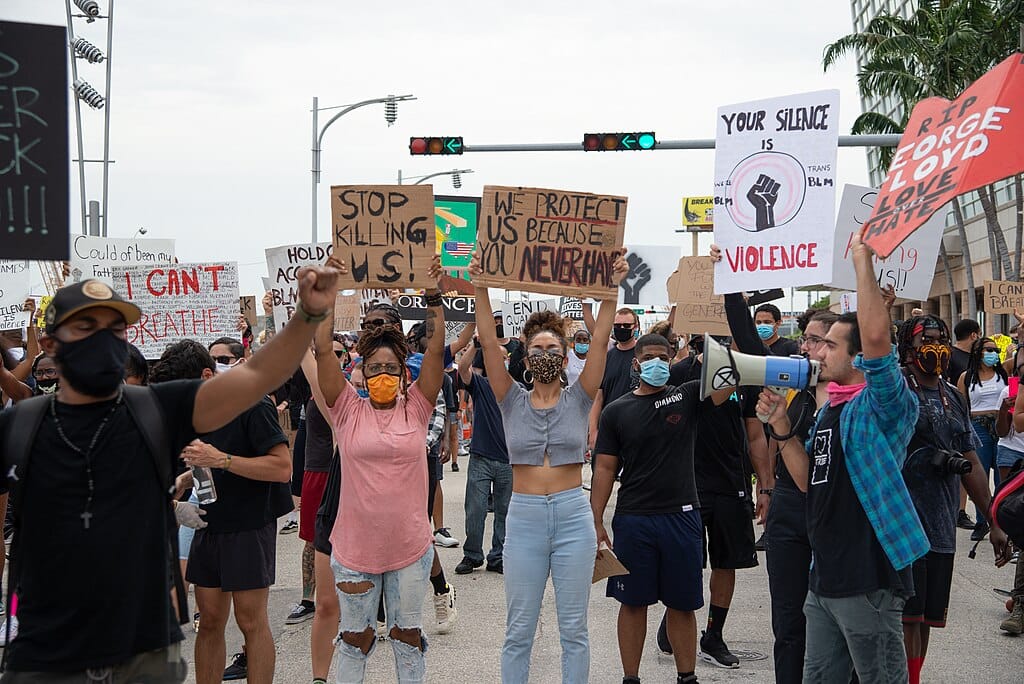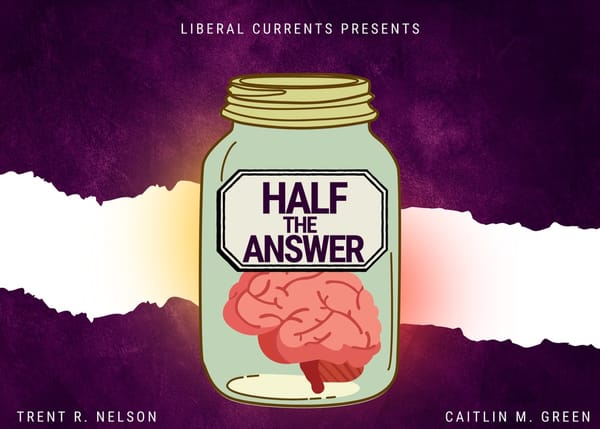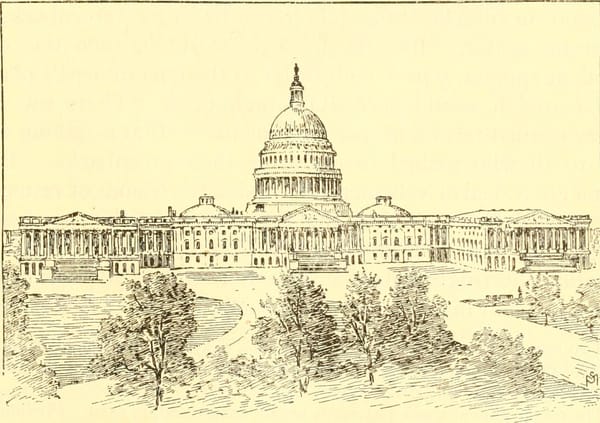Chris Rufo and the Great Liberal Threat
Rufo is the latest in a long line of conservatives who project their own victimhood to mobilize support.

“The church can only defend its own space by fighting, not for space, but for the salvation of the world[1].” These words, while originating from noted German theologian Dietrich Bonhoeffer in his book of Christian ethics, happen to envelop a specific type of crusading zeal and defiantly upright posture that translates nearly perfectly to the political discourse of 2023. We live in an epoch of “culture war,” a world where our political blocs and societal milieus define themselves vis-à-vis differences in lifestyle and thought patterns. It's a world that scoops up petty squabbles and mushrooms them to a broader argument over social distinctions.
This war is a struggle that is owned by everyone but yet is in service to nobody. And it is of importance to no specific group more than American movement conservatives. To the American right, winning this “culture war,” this cataclysmic contest against an impenetrable foe fought for the sake of Western civilization, has become, over the past three years, item #1 on the conservative agenda[2]. No more political campaigns focusing on tax breaks, on economic growth, on the inner sanctum of free markets. All of these issues are rendered meaningless if the society they, as conservatives, so cherish comes under the control of a force that, in their eyes, is so antithetical to Western values that it leaves this society spiritually and corporally corrupt.
In this, one 39-year-old man has made it his mission, almost his godly calling, to turn the paradigm of conservative societal consensus into perpetual conservative offense. To many involved in politics, he is a vengeful petty hack, pushing broad, intensive canards against foes who have little ability to defend themselves. But to a few, a happy few, Christopher Rufo has been a godsend and a hero. And as liberals, we must understand why that is.
Background
Rufo didn’t come from nowhere. A former visiting fellow at the conservative stalwart Heritage Foundation and a Lincoln Fellow at the Claremont Institute, the hearth of West Coast Straussianism, Rufo had the classic credentials to become a proper right-wing activist. He even had another fellowship with the Discovery Institute, a think tank noted for its opposition to Darwinian evolution and its lobbying for the teaching of intelligent design at public schools. But since 2021 especially, Rufo has skyrocketed in popularity, essentially becoming the face of the backlash to Black Lives Matter and the slow procession of cultural liberalism into mainstream American life. While he has had plenty of media appearances for us to approximate a worldview, until 2023 Rufo maintained a rather elusive persona to researchers of the right. But with the publication of his book America’s Cultural Revolution, we finally have the ability to divulge from its textual crevices Rufo’s philosophy and methodology.
This spoonful of right-wing talking points and historiography, clarifies Rufo’s place in the American conservative tradition. He might be a hack, a town crier for the anti-woke right, but he isn’t a mere infantryman. He’s a coherent thinker, a pragmatist with a clear understanding (as warped as it is) of 20th-century history, and a regime of praxis for how to turn back that tide of “wokeness.” If we allow ourselves to take Rufo at his own words and ideas, regardless of how silly we find them, we can realize the rationales conservatives take up for their illiberal turn and map out the battle plans being made to vacuum out liberalism from its enshrined place in the American experiment. And, in order to do just this, we have to reckon with the fact that the conservatism of yore, if different in cosmetics and dialogue, shares essentially the same superstructure as the Trumpism of today.
The culture wars have existed for a while now, from its first embers flashing in the 1970s, to its etymological coronation by Pat Buchanan at the 1992 Republican Convention, all the way to the public battles surrounding questions of same-sex marriage, marijuana usage, and political correctness that defined the 2010s. But ever since 2020, in many ways definable as the Year Zero of our current moment, it feels that a new form of culture war has been brewed. For many conservatives, 2020 served as an annus horribilis, from the expansions in government spending and oversight thanks to COVID-19, to the pandemic’s forced closure of the entire public square, all the way to former Vice President Joe Biden’s victory over Donald Trump in November. But one matter overtook all of these disasters in importance. While COVID and even Trump’s loss might’ve served as political roadblocks, one defining societal moment threatened to obliterate their whole worldview.
When a Minneapolis policeman murdered George Floyd in full public view in May, the shock and anger was immeasurable. It fostered a mass movement of people of all ages and races, protesting, in record numbers, for the end of police brutality and systematic racism. These protests, still the largest in American history, might not have ended police brutality outright, but they brought about something even more outstanding in the conservative imagination. As they tell us, it forced American society to panic over a racist past and present, a perspective that conservatives believe to be pure fantasy. With this reckoning, society panicked and, in haste, crudely created a new societal order that honored these activists at every word they uttered. Major corporations soon created stronger departments of diversity, equity, and inclusion (better known by the abbreviation DEI), colleges and high schools sponsored new curriculums on black history, and major politicians of both partisan stripes joined in on Black Lives Matter protests and swore to redirect their attention toward this national outcry. The world seemed to be laughing at conservatives, mocking them for standing out from the crowd. No matter what they spewed about riots in Democrat-run cities or reverse racism against whites or spooky stories about statues being torn down, nothing seemed to truly stick, to sink into the mindsets of American liberals. What were they ever to do?
Christopher Rufo had been active in conservative circles for a good while before he made his name by covering the George Floyd protests. He initially focused on specific occurrences in his city of Seattle, but soon expanded his reach, becoming a sort of white knight for the right against this new muscular leftism. Since then, he’s become a policy whisperer to Florida Gov. Ron DeSantis, frequently visited Tucker Carlson’s Fox News program, and even encouraged Trump to invoke an executive order banning federal agencies from providing diversity training[3] [4].
But more than anything else, Chris Rufo has made his name as the apostle of the anti-critical race theory movement. This moral panic dominated the political discourse of 2021, creating such a stream of fury among movement conservatives that by 2023, sixteen states have laws on the books that, in one way or another, prevent public school teachers from discussing aspects of American racism in their classes. Previously a relatively obscure academic discipline stuck in the debates of the ivory tower, critical race theory had now become not only a cultural flashpoint but a full-on boogeyman. But that was the exact goal of the panic’s flamethrowers. There was no need to care about precise definitions; that wasn’t the reason why the term came of use. It had a greater purpose: a catch-all for conservative resentment of this racial reckoning and all it entailed.
Rufo has been honest about the point of this naked propagandizing; once tweeting,
We have successfully frozen their brand—'critical race theory’—into the public conversation and are steadily driving up negative perceptions. We will eventually turn it toxic, as we put all of the various cultural insanities under that brand category…the goal is to have the public read something crazy in the newspaper and immediately think 'critical race theory.’ We have decodified the term and will recodify it to annex the entire range of cultural constructions that are unpopular with Americans.[5]
The name of the game isn’t to stop just a mere legal framework from further societal intrusion. No, the goal is to amalgamate so many tics and theories and talking points so closely as to create a Frankenstein’s monster of leftism run amok. The plan has worked so far, but Rufo has grander designs. So, he decided to elucidate them in the form of a book.
The book
Rufo’s tome, America’s Cultural Revolution: How the Radical Left Conquered Everything, published to great fanfare in July 2023, presents itself with a dual purpose. It mixes a social critique, a fairly researched foray into the intellectual histories of four leftist thinkers (Herbert Marcuse, Angela Davis, Paulo Freire, and Derrick Bell, specifically), and a political manual for reactionary revolt, describing to its conservative readers measures and steps they can take to prevent the furtherance of the leftist menace. Profiles of these four figures, detailing their academic careers and psychoanalyzing them as mere creatures of coincidence, liberally intertwine into case studies of leftist overreach and broadsides against the doctrines of the “radical mob.” To Rufo, all of American society’s current ills are traceable, if not solely, primarily to the causes these thinkers espoused. In fact, these four horsemen of the apocalypse serve more as figureheads for the general trends and bearings Rufo despises than genuine arbiters of destruction. Eventually, the book concludes with a mini-manifesto professing the need for “counter-revolution,” with Rufo expounding on the contradictions of critical theory and how, by understanding these contradictions, conservatives can play upon them to evince the backlash they so desire.
Rufo bifurcates himself in the book, creating a diptych of two men: Rufo, the researcher, and Rufo, the agitant. I was surprised to find that Rufo cites hundreds upon hundreds of leftist works and sources. Even when considering the usual abuses of leaving out context and negatively interpreting every mishap of the left, the relative sincerity that Rufo provides in his investigation into ideological covalences within the American left is something not often found in conservative polemics. Even so, a person does not need Rufo’s magisterial breadth of acrimony to know that genuine criticisms can and have already arisen from these figures for their hypocrisies and misdeeds. The New Left would frequently apologize for oppressive tyrants like Mao Zedong[6] and Erich Honecker[7]. The American Left has had a dialogue on these shortcomings of theirs running for 40 years now, and the discourse is still sprouting new buds to this very day.
But then this dichotomy leads us to Rufo, the agitant. Rufo writes in such hypertrophic phraseologies as “I have seen the hideous face of revolution” and “the triumph of the new ideological regime,” mantras that work wonderfully as provocative rhetoric but erudition-wise are pitiful and lazy. Rufo, at nearly every opportunity he can, will take a leap of faith so audacious that its weight would break a trampoline. He will take (or, in some cases, concoct out of thin air[8]) specific instances of academic folly and blow them up into a hot air balloon full of oversized proportions. The blatant hackery serves to make the diptych already presented even more drastic and leads us to another, grander question that underlies this whole practice in scholarship. As someone clearly within the good graces of the upper echelons of American conservatism, including a former President, how can Rufo coagulate all the different gobs of information within this text, where raconteurs and vagabonds lift just above their weight to inspire the broader culture, to assemble a clear and unmistakable proof of a conspiracy against a battered and weakened right on the proverbial ropes, which Rufo’s sloganeering clearly implies?
The latest in a long line
In truth, Rufo is only the newest spokesman of a classic rightist canard. Ever since the founding of such paradigmatic institutions as National Review, American movement conservatism has always viewed itself as the outsider looking in, an underdog sizing up against an opponent so powerful and so hegemonic that the idea of fighting seems futile. This loser mentality does seem ridiculous at first glance, especially if viewed from a liberal perspective. After all, how can we seriously consider conservatism an ideological David after living through the presidencies of Ronald Reagan, both George Bushes, and Donald Trump? Yet the very strategy that has led to such clear victories require that conservatism constantly view itself as a pipsqueak. No matter how facile, no matter how incoherent the self-inflicted minimization might seem, it falls upon a straightforward dictum: the matter of conservatism rests upon a notion of a great enemy.
It inspires it to achieve great endeavors, soar across any proverbial building, and persevere through every rhetorical boxing match. In order to make your argument seem grander than mere political disagreement, you must portray yourself as standing athwart history and shouting in its big haggard face, “Stop!” William F. Buckley Jr., that great court philosopher of rightism, said as much in National Review’s opening statement, “Radical conservatives in this country have an interesting time of it, for when they are not being suppressed or mutilated by the Liberals, they are being ignored or humiliated by a great many of those of the well-fed Right.[9]” Jeane Kirkpatrick, noted political scientist, former Trotskyist, and eventually Ronald Reagan’s Ambassador to the United Nations, wrote that the New Left “swept through American cities, campuses, and newsrooms, challenging basic American beliefs and transforming American institutional practices.[10]” Michael Anton, a Natural Security Council official during the Trump administration, wrote in his anonymously published 2016 essay “The Flight 93 Election” that, “To simultaneously hold conservative cultural, economic, and political beliefs—to insist that our liberal-left present reality and future direction is incompatible with human nature and must undermine society—and yet also believe that things can go on more or less the way they are going, ideally but not necessarily with some conservative tinkering here and there, is logically impossible.[11]”
Rufo is not bringing new meat to the kitchen table. That gut feeling of persecution is simply the latest arrangement of an old conservative hymn. Whatever shape or form it may be, the carol goes, the Left is too powerful for us to submit ourselves to its torment any longer. The battle plan shall no longer be to play simple defense, to merely prevent the incursion of any more leftism. No, the time is now for offense. But even so, old habits die hard. When it comes to rhetoric, for every step forward in society, movement conservatives reach into their back pockets and take three steps in reverse, all the while thinking they’re making an original move.
Rufo and Burnham
America’s Cultural Revolution reaches into another right-wing canon, this time holding a much more sinister and dangerous permutation. To Rufo, the radical Left is not simply the outlook that happens to have imperium over the modern American nation. It also serves as a MacGuffin, like in the Hitchcock thrillers of old, for a campaign of complete rightist domination. Rufo quite obviously does believe that America is beholden to leftist special interests and that we, as a society, live in a culture that perenially tilts leftward. Still, he doesn’t need these forces to convince himself of the need for a conservative societal coup d’etat. That’s already a given, and the boogeyman of the Left gives him the proper mental justifications for removing whatever previous inhibitions he now knows he can forego.
Rufo isn’t starting fresh ground here, either. James Burnham, another foundational conservative intellectual, created the understructure for this forceful Weltanschauung. In his 1966 screed, Suicide of the West, Burnham writes that liberalism, in its modern connotation, is defined primarily by the emotion of guilt. He says, “The feeling of guilt with its accompanying anxiety is rooted much too profoundly [inside the liberal imagination] to be affected by the quibbles of reason. Guilt is integral to liberalism, and the feeling of guilt is an integral element in the liberal motivation, with all the weighty consequences that follow therefrom for both individual conduct and social practice.”
Now, while this axiomatically seems only to assume liberal inclinations toward fealty and not call for actions to protect society against it, one must look closer. Under the façade of coolly rational and unemotional analysis, Burnham assigns liberalism with the nomenclature of a philosophy of self-inflicted doom. It's not that the liberal is malfeasant; it's not that they actively are seeking to destroy the societies they live in; they just happen to, by their nature, afflict wounds independently of their conscience. That innate attachment towards contrition, that core affectation of “this feels bad,” positively ensures that a liberal must always act against their interest. If they did happen to act in their interests, they’d get sucker punched by their comrades.
This perception, taken to its logical next step, forces one to ask whether we should allow the liberal to entail society to their guilt. Burnham slyly responds, “When the Western liberal's feeling of guilt and his associated feeling of moral vulnerability before the sorrows and demands of the wretched become obsessive, he often develops a generalized hatred of Western civilization and of his own country as part of the West.[12]” Again, Burnham plays a game of rhetorical hopscotch. He never flatly explains or asserts what he thinks should be done to the liberals but provides all the reasons necessary for one to think of negative punishments in his place. The liberal and their continual sense of moral culpability don’t just end in routine self-flagellation. Nay, they add up, slowly but assuredly, into a vociferously negative disposition towards the society that fostered them.
Burnham almost seems to express this distaste in Freudian terms, and it infers that liberal anger towards the failures of Western civilization is purely psychosomatic. To Burnham, liberal guilt is but the laziest and yet rawest form of liberalism’s revolutionary Jacobin birth, and to entertain it any longer only brings the worst of consequences. After all, it’s in the book's name: Suicide of the West.
Rufo, clearly inspired by Burnham, brings this mindset to his book. Time and time again, Rufo berates America’s institutions for allowing themselves to become festered with this radical ideology as if he were a scornful parent. But, at the same time, he acts as if he expects them to work this way anyhow. It's left unsaid, but underneath every line of Rufo’s text and all its collective sneer, Burnham’s epistles of liberal guilt roam free. This particular kind of reactionary mindset is partially the reason why Rufo is so eager for conservative counter-revolution; it's just so blatantly obvious. The “silent majority,” that non-liberal but non-reactionary swath of nameless Joe Schmoes who only think about their own needs and their living existence, will never be racked with liberal guilt. But they will almost assuredly find it to be incredibly distasteful once it's brought to their attention. If Rufo can find a way to play upon this displeasure, this evidently harebrained idiocy inside liberalism, the radical Left may yet be able to be stopped in their tracks.
The contemporary reactionary mind
So, what’s the importance of this book? Why should we care about Chris Rufo? Well, one thing should be abundantly clear: Chris Rufo is no Russell Kirk. In all its purple prose glory, America’s Cultural Revolution won’t ever attain a pedestal in the conservative literary pantheon, next to The Managerial Revolution, Ideas Have Consequences, God & Man at Yale, The Conservative Mind, and The Closing of the American Mind. Don’t expect to find your grandchildren reading the words of Christopher Rufo in their college courses on American conservatism. But America’s Cultural Revolution is beneficial in a whole other format; it’s a window into the contemporary paranoid reactionary mind.
Rufo’s ability to be a successful propagandist gives any critic of non-rightist temperament a firsthand glimpse into what issues and frameworks move a conservative to act. Why is critical race theory, and all it seems to stand for among this specific sect of the general populace, such a lightning rod of right-wing controversy? Well, it touches all the proper buttons for a conservative. It’s too progressive for their tastes, for one, but it also portends a darker future for the America they thought was theirs. That ownership they cling to so strongly will have to open up to a larger pie, and for these folks, that’s genuinely frightening.
Additionally, America’s Cultural Revolution serves as a guidebook to what the culture war will look like in the future, as it is clear that the “counter-revolution,” however it may play out, is not even close to being over. Rufo’s hysteria is so totalizing, so grandiose, that one can positively assume that the backlash will only grow in power and determination. The point of America’s Cultural Revolution, at the end of the day, might not even be about describing the “long march through the institutions” that the American Left partook in through the late twentieth century. Instead, it’s a permission slip, a testament of conscience announcing that all hands are now on deck. For that, liberals and leftists should take heed. The worst is yet to come.
[1] Bonhoeffer, Dietrich. Ethics. Eberhard Bethge, 1949.
[2] Roberts, Kevin. “Winning the Culture War In an Age of Incoherence.” The American Conservative, 1 May 2023, www.theamericanconservative.com/winning-the-culture-war-in-an-age-of-incoherence/.
[3] Kruse, Michael. “DeSantis’ Culture Warrior: ‘We Are Now Over the Walls.’” POLITICO, Axel Springer SE, 24 Mar. 2023, www.politico.com/news/magazine/2023/03/24/chris-rufo-desantis-anti-woke-00088578.
[4] Guynn, Jessica. “President Joe Biden Rescinds Donald Trump Ban on Diversity Training About Systemic Racism.” USA Today, 20 Jan. 2021.
[5] Meckler, Laura, and Josh Dawsey. “Republicans, Spurred By an Unlikely Figure, See Political Promise in Targeting Critical Race Theory.” The Washington Post, 21 June 2021.
[6] Wiatr, Jerzy J., and Henry F. Mins. “Herbert Marcuse: Philosopher of a Lost Radicalism.” Science & Society, vol. 34, no. 3, 1970, pp. 319–30. JSTOR, http://www.jstor.org/stable/40401496.
[7] Breuer, Rayna. “‘Comrade Angela Davis’: An Icon in East Germany.” DW.com, Deutsche Welle, 12 Oct. 2020, www.dw.com/en/how-angela-davis-became-an-icon-in-east-germany/a-55237813.
[8] Meckler, Laura, and Josh Dawsey. “Republicans, Spurred By an Unlikely Figure, See Political Promise in Targeting Critical Race Theory.” The Washington Post, 21 June 2021.
[9] Buckley, William F. “Our Mission Statement.” National Review, 19 Nov. 1955.
[10] Stelzer, Irwin M., and Jeane Kirkpatrick. “Neoconservatism as a Response to the Counterculture.” The Neocon Reader, Grove Press, New York, NY, 2005, pp. 235–240.
[11] Anton, Michael. “The Flight 93 Election.” Claremont Review of Books, Claremont Institute, 5 Sept. 2016, claremontreviewofbooks.com/digital/the-flight-93-election/.
[12] Burnham, James. Suicide of the West : An Essay on the Meaning and Destiny of Liberalism. John Day Company, 1964.
Featured image is George Floyd Protest in Miami, by Mike Shaheen




